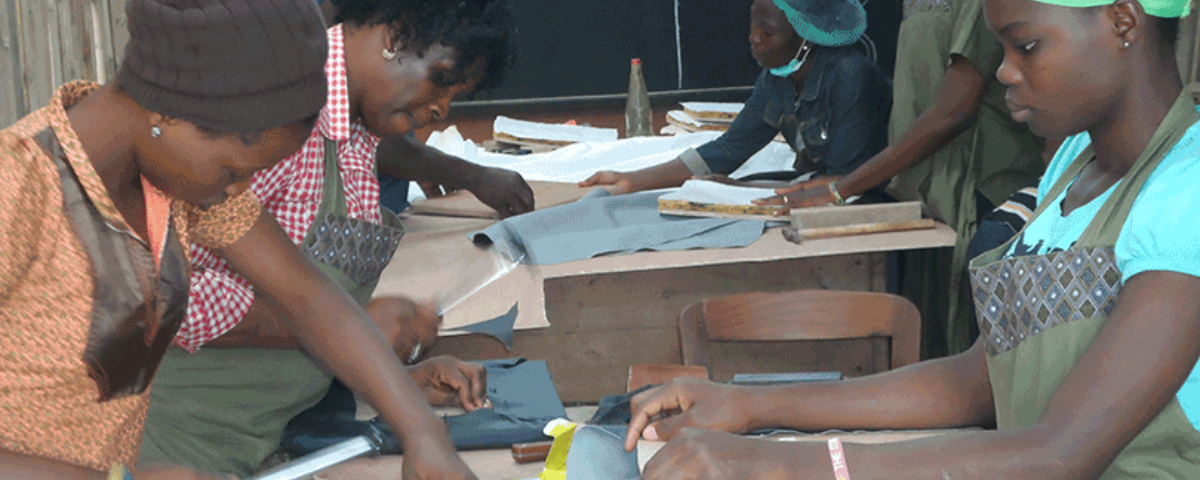

Keep this story going! Share below!
Transforming ordinary women, university graduates and MBA holders into carpenters. Not just for the fancy of holding the tools and putting together pieces of wood, but more, to give meaning to their lives, to convey to them a feeling of belonging and usefulness, to reshape their existence confidently and completely.
Design for Life (DFL), created by Dr. Bukola Aluko-Kpotie, realized the need to give women in Nigeria an opportunity to take charge of their lives and design a better future for themselves and for their families. In order to achieve this goal, Dr. Bukola used the resources she had on hand, which were her business knowledge and fulfilling a need in the marketplace. She felt she could train these women to be carpenters, thus empowering them with a physical skill and creating the ability for them to work for her furniture company.

With the intent of producing a profitable business, Design for Life was born. Dr. Bukola took advantage of her marketing strengths to generate customers. In order to ensure the work was of the best quality, she had her workshop located close to her mentor’s home, a 76-year old carpenter, who taught her most of what she knows today.
With a clear and profitable business model in place, where artisans worked with Design for Life on contracts and were paid on this basis, Dr. Bukola pursued jobs and managed their direction and timely delivery. Dr. Bukola could now begin to realize her dream of having a team of female carpenters.
Initially, a set of nine women were chosen. In the first set of DFL female trainees, only five graduated. The program runs for two years and in order to receive a certificate of attendance, each student must carry out a solo project at the end of the course. The concept was to apply everything the trainee had learned through the course of the trainings. After this graduation, the trainee has become a professional carpenter and can begin her career and her financial independence.
The main impact has been to promote gender equality in Nigeria and to enable improved working conditions and empowerment for women and girls in the specific area of Lagos. The positive consequences of this innovation allow for the vision of DFL to become clearer and more concise and to train female carpenters to take charge of their own lives. The continuity of the business is believed to be quite strong. “DFL is profitable and as long as we make profits, we will train young women”, assures Dr. Bukola. The passion for her female carpenters has remained, despite the strenuous nature of her business.
“I just keep going because I have a passion and I feel its impact each day when I see women able to do carpentry."
The furniture industry in Nigeria is considered an untapped gold mine. In the past, it was characterized by low-quality furniture. This contributed to Nigerians purchasing furniture from outside the country. This also indicates a lack of skilled laborers for the job. About ten years ago, there was a ban on the importation of finished furniture; this has created opportunities for growth for indigenous furniture firms. Apart from the lack of skilled labor in the industry, other problems associated with this sector include the perception that furniture making is for illiterates and those with other deficiencies. It is therefore imperative that adequate training is provided for the members of this sector and that the perception of these skilled laborers, including women, is shifted.
When Dr. Bukola understood there was an area of opportunity in the furniture industry, she saw that she could transform her passion into business. Although she saw carpentry shops flooding the streets of Lagos, she quickly noticed the poorly constructed pieces of furniture. It became clear to her that among the many artisans, very few were actual professionals. The number of artisans also displayed another message; the market was large, and there was a high demand for quality furniture.
A more powerful insight also surfaced. As many artisans as there were in the city of Lagos, there were also unemployed women. Among them were housewives who heavily relied on their husband’s wages, and who most times, struggled to meet their needs and those of their children. The unemployed single women of Lagos were often in even more of a difficult position, as they could not afford to take care of themselves. Dr. Bukola was able to create an opportunity for a better future for these women with the establishment of Design for Life.
Get stories of positive business innovations from around the world delivered right to your inbox.
Not available, Not available
